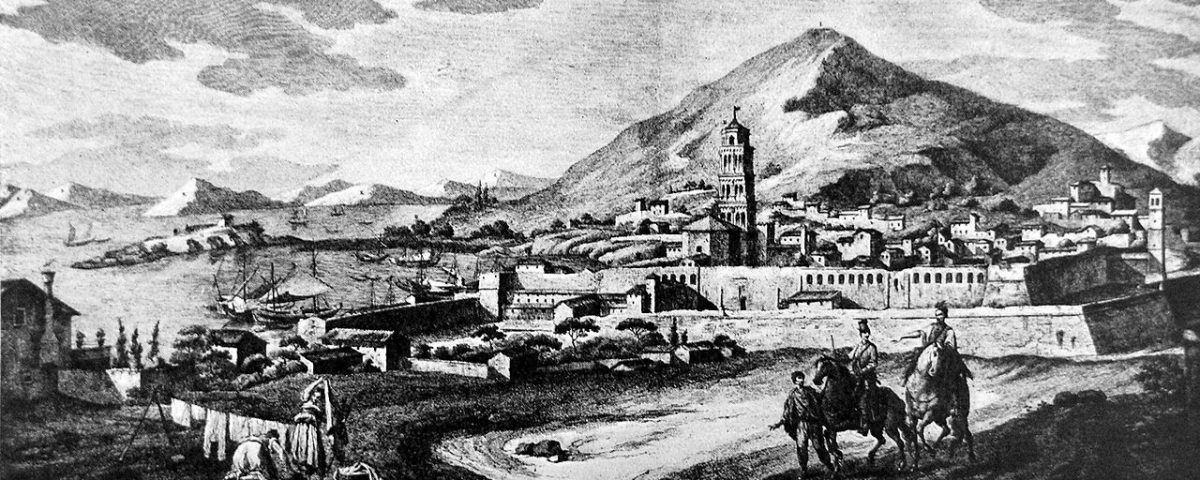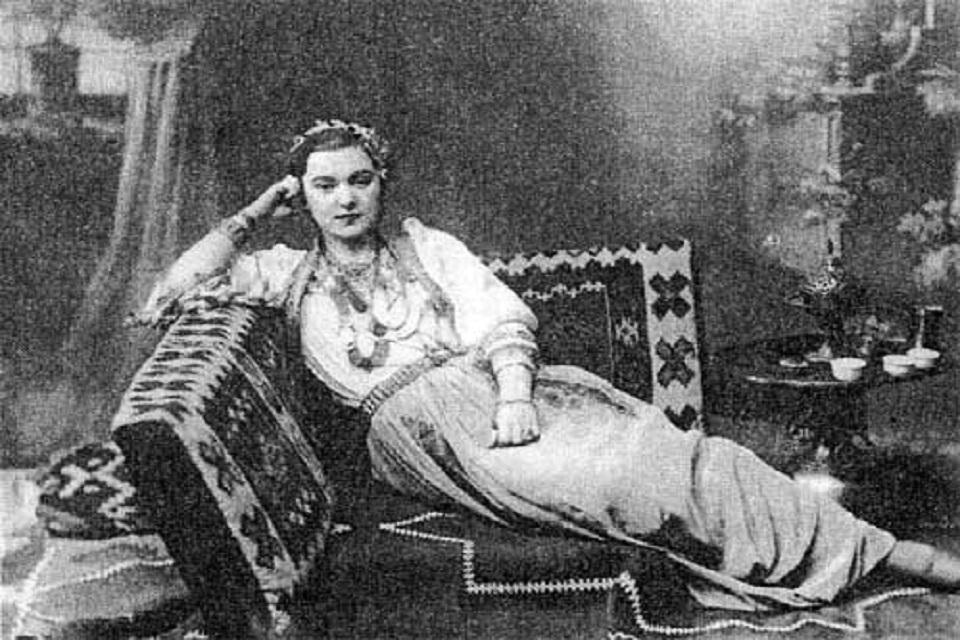The first and well documented trace about the Sevdalinka reaches far into the XVI century (more precisely 1574) and is interestingly linked to Split. It is owed to the then Prince of Split, as he sent the proofs of the true events, as well as the songs about them together with the regular mail to the Venetian Senate. This record is in the book: Vincenzo Solitro: Documenti Storici sull’ Istria e la Dalmazia. Venezia, published in 1844. (Munib Maglajlić, 1983).
This document tells about the unhappy love between the Bosniac Adil from Klis and Marija (Mara) Vornić from Split;
The Split prince also kept the memory of the local poet Franjo Boktulija, who wrote an epitaph into the fate of the unhappy young woman – the “Bidna Mara”, as well as the satirical-allegorical poem about the relationship between the Republic of Venice and the Ottoman Empire.
Consequently, this record bears witness to the early attempt to sing in the spirit of what we call sevdalinka.
The report of the Split prince was also discovered by the poet Luka Botić, also from Split, and published in his poem “Bijedna Mara” in which the main theme is the forbidden love of the young Muslim Adil and the Christian Mara.
It is a poem with six ten-lines. Actually, Botić translated the report of the Prince of Split from Italian.
Here is the essence of the princely report after Botić’s translation:
“A girl who was on her way from Vranjica to Split to sell wool, the said Bosniake intercepted her and took her with him, but the girl’s father and brother met them, as they too were going to the Split market, and stopped him. The young man justified himself by saying that the girl resembled another from Klis, who had run off with her fiancé in an unknown direction. Since he thought it was her, he had wanted to bring her back. After they threatened him urgently, the father and brother finally left him alone. But after he left, she told him that she had seen him before, that he had told her some things and asked her to come along. To those who were investigating the case, among them the Splinter Prince, the girl, on the other hand, presented new details which showed that the situation was different from what she admitted to her own. This can clearly be deduced from the part of the princely report describing the meeting of the Muslim from Klis and the Christian girl from Vranjica, based on her own statement: “And that he was once in her house in Vranjica, complaining that he was thirsty and asking her to pour him water; she brought him wine. This we heard from her mouth; and when she spoke, she turned red and stuttered. We pretended to see and not to notice anything, but were we satisfied that no unpleasantness, as usual, happened, by force, that the astuteness and experience of Your Excellencies, on the other hand, could easily guess…”. (Maglajlić, 1983)
So Luka Botić further translated the letter of the high Venetian official:
“So I must tell Their Highnesses that last year at the beginning of March, when it seemed as if the whole world was rejoicing and kissing in spring, a young Turk of just 18 years of age, beautiful and richly dressed in her own way, honestly wealthy, came to the market. Once he came and brought wax and perfume and honey and a good grey mould, without any pinto. Usually he came alone and only with two servants. The Turks called him aristocracy, but ours said Adelić. Our women preferred to buy from him; and he always behaved decently and appropriately. His own envied him and ours took him very much to heart. And one day there was no Adelić, the Turks swore that he went with them, but then would have overtaken them. This was repeated on several days and the Turks said: “HE IS AŠIK” (emphasized S.V.), which meant that he was in love.
And now I must tell you, Your Highnesses, that once when Adelić came, the Vornić’s also came to the market and with them the two beautiful and enchanting sisters Ivanica and Marija; both very well and tastefully dressed, with gold and jewellery, as the house Vornić was quite wealthy. The brothers Vornić showed themselves not so long ago as they should have done, as Their Highnesses might know from my other songs. There Adelić and Marija, who is younger, just over 14 years old, liked each other and fell madly in love. But the girl had hers and the sister with her and was afraid of God and the Virgin, because Adelić was Turkish.
She cried, but said nothing, just stuck to her sister. The young man crept around her house, but never said anything. And so he forgot about the market. But once the Vornić’s showed up at the market, he showed up there too.
When the sisters were around, he started to sing an old Slavic song which meant this:
“THE TURK TOOK A LIKING TO OUR LITTLE DOVE. I AM TURK. HER FACE IS BRIGHTER THAN MY WAX, MORE BEAUTIFUL THAN THE ROSES I SQUEEZED OUT…” (stressed S.V.; Botić, 1949, 1996; Maglajlić, 1983)
The Turk fell for our dove. I am a Turk. I heard him say that her lips are sweeter than my honey. “Your dove is of more beautiful shape and size than my horse.”
When he sang, the Turks smiled and said, “He’s Ašik.” He heard that and left. And Marija was crying when they asked her father and brothers what she had? She couldn’t say anything because she was crying and complaining. So the other sister began to beg the father and the brothers to go home, not to make a fuss and shout that she and Marija would confess. They left immediately; but when they heard what was going on, they pressed the girl to go into the convent, and that she should be certain never to come out again. That she had brought shame on her house, which had always been proud and decent; that this was outrageous and that she now had to be hidden from the others, who would have given the reason for this? The venerable priest and preacher Mr. Damjan Tupić, her house priest, negotiated and advised the father and the brothers until they finally decided to send the girl to the monastery, where she was to stay for two years until the shame was forgotten. And she left and with her her sister, since they could not separate. Meanwhile, Marija fell ill; when Adelić heard this, one evening he shot an arrow through the bars with a letter in which he said: “If you are healthy and those of you wish to give you to me, I will cross myself and be of your faith. Someone, you don’t know who, took the letter and delivered it to Vornić’s. They raged because of the insult and out of pain and demanded that nobility was no longer allowed into the city. Meanwhile the girl withered away and died. They buried her in the monastery and the writer and philosopher Boktulija sang about her in Slavic:
“Our little dove, dressed in a beautiful feather, had a sore heart; a hunter came from afar and wounded her: poor Mara!
Father and mother did not want her, did not hug her, did not lick her wound, and the dove died: poor Mara!
She carved these verses on the tombstone and even today she sings to everyone that it is sad to hear. Ivanica didn’t come out, so she’s still in the convent, she wants to stay a nun as long as she lives.”
Summing up the context of the princely report, Botić made a rather successful poetry review of this tragic story about the unhappy love of the Bosnian Adil and the splinter Mara. Here is part of the adaptation:
«U Turčina đulvodica,
slatko miriše;
al’ je ljepša djevojčica,
ljepša od ruže;
A ja Turčin ginem za djevojkom,
Za djevojkom, krotkom golubicom!
U Turčina bio vosak,
Bio izbiran.
Al’ djevojka još bjelija,
No je vosak sam;
A ja Turčin ginem za djevojkom,
Za djevojkom, krotkom golubicom!
U Turčina med je sladak,
Sladak, presladak;
Al’ riječi djevojčice,
Slađe od meda;
A ja Turčin ginem za djevojkom,
Za djevojkom, krotkom golubicom!
U Turčina žerav konjic,
Kao pelivan;
Al’ ni konjic nije stasan,
Kao djevojka;
A ja Turčin ginem za djevojkom,
Za djevojkom, krotkom golubicom!
One can conclude from this that the unluckily in love Bosniake Adil was not only the first known sevdalinka singer, but also their first famous poet.


